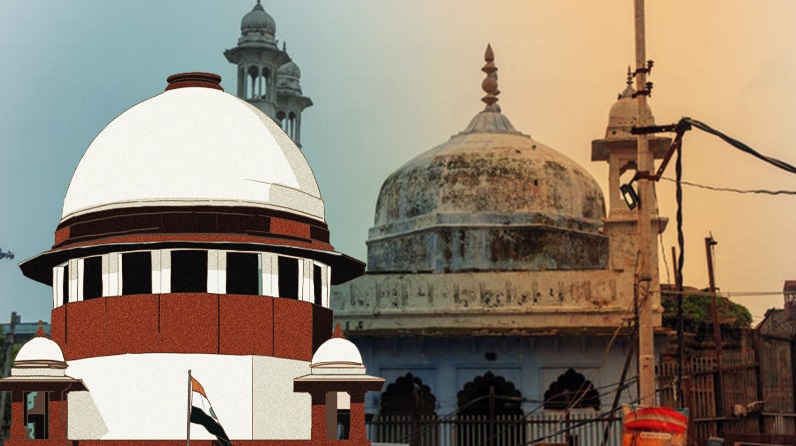
Image: Live Law
The Centre has been granted time till December 12 to file a comprehensive affidavit in response to pleas challenging certain provisions of the Places of Worship Act, 1991. A bench comprising Chief Justice D Y Chandrachud and Justice J B Pardiwala was informed by Solicitor General Tushar Mehta that the Centre was deliberating the matter at the highest level and thus was seeking more time to file response, which has been pending since March 2021. The case will be heard in the first week of January 2023.
The Act, legislated by Parliament in the backdrop of the Ramjanmabhoomi agitation, freezes the status of religious places as they existed on August 15, 1947. After the Babri mosque demolition, the central government passed this law to save and protect the religious character of all places of worship, to avoid any such communal disturbances in the future. The law kept the Ram Janmabhoomi-Babri Masjid dispute out of its purview, without citing any reasons for the same but probably because the case was sub-judice at that point in time.
About the petitions
Former BJP Delhi Spokesperson Ashwini Upadhyay, BJP Rajya Sabha Member Dr. Subramanian Swamy, and others filed writ petitions challenging the Places of Worship Act, 1991. Moreover, parties filed roughly 15 impleading petitions, some of which were in favor of the law and others of which were against it. The petition by Ashwini Upadhyay alleged that the 1991 law creates an “arbitrary and irrational retrospective cut-off date” of 15 August, 1947, for maintaining the character of the places of worship or pilgrimage against encroachment done by “fundamentalist-barbaric invaders and law-breakers”. He also contended that the 1991 Act took away the rights of Hindus, Jain, Buddhists, Sikhs to restore their places of worship destroyed by “barbaric invaders”.
The Royal Family of Kashi, Jamiat Ulema-i-Hind, and other parties who submitted impleadment and intervention applications were also permitted to present their arguments at the case’s hearing. On September 8, the erstwhile royal family of Kashi filed the application claiming that the Act is a “textbook example of a legislation that was passed in the most undemocratic of manners possible,” disregarding the fundamental rights of those who are harmed, especially the right of formerly colonised indigenous communities to seek the reclamation of occupied religious and cultural sites.
Dr. Subramanian Swamy, the leader of the Bharatiya Janata Party, attempted to argue that the PoW Act should be read down in order to exempt the Kashi Vishwanath and Mathura Temple from its provisions. It is noteworthy that both temples are currently in the middle of litigations w.r.t mosques being built alongside them.
The Places of Worship Act
The Act states that all suits, appeals or any other proceedings regarding converting the character of a place of worship, which are pending before any court or authority on August 15, 1947, will abate as soon as the law comes into force. But there are exceptions to this as well, any place of worship referred to in the said sub-sections which is an ancient and historical monument or an archaeological site or remains covered by the Ancient Monuments and Archaeological Sites and Remains Act, 1958 is not declared to maintain its religious character. It is unclear why this was done.
One then wonders why are there suits in courts in this day and age making attempts to reinvigorate Hindu temples and why were they being entertained in courts if the law does not allow it? The language of the Act is clear when it states that no suit shall lie on or after such commencement (of the Act) in any court for conversion of the religious character of any place of worship, existing on the 15th day of August, 1947. So, clearly, it is not just a penal law that provides punishment for contravention but also disallows suits that seek to challenge places of worship.
The section 3 of the Act clearly states, “No person shall convert any place of worship of any religious denomination or any section thereof into a place of worship of a different section of the same religious denomination or of a different religious denomination or any section thereof.” The objective of the law was clearly to maintain communal harmony in the future.
Petition against the Act is misconceived
As rightly pointed out by an article published by Newsclick, the petitions challenging the Places of Worship Act are misplaced and misconceived. The Act is rooted in the realisation that the need to protect religious places and to maintain its character is a sine qua non to avoid religious conflagrations. It was one of the contributory factors towards the evolution of secularism as an essential feature of modern constitutions. The plea to invalidate the Act and allow conversion (or re-conversion) of certain places of worship through suits, petitions or otherwise is thus not only antithetical to the fundamental values and express provisions of the Constitution, but undoes the civilisational gains of humanity in terms of secularism being a sine qua non of a peaceful and progressive society.
Even without the Act, any attempt at conversion of religious places would run counter to freedom of religion as well as to the values of liberty, equality and fraternity, which are the basic features of the Constitution. The Act expressly enunciates and delineates what is inherent in the Constitution; any such articulation cannot even remotely be unconstitutional.
Related:
SC to hear pleas challenging the Place of Worship Act on October 11
The Challenge to Places of Worship Special Provisions Act, 1991 is Misconceived